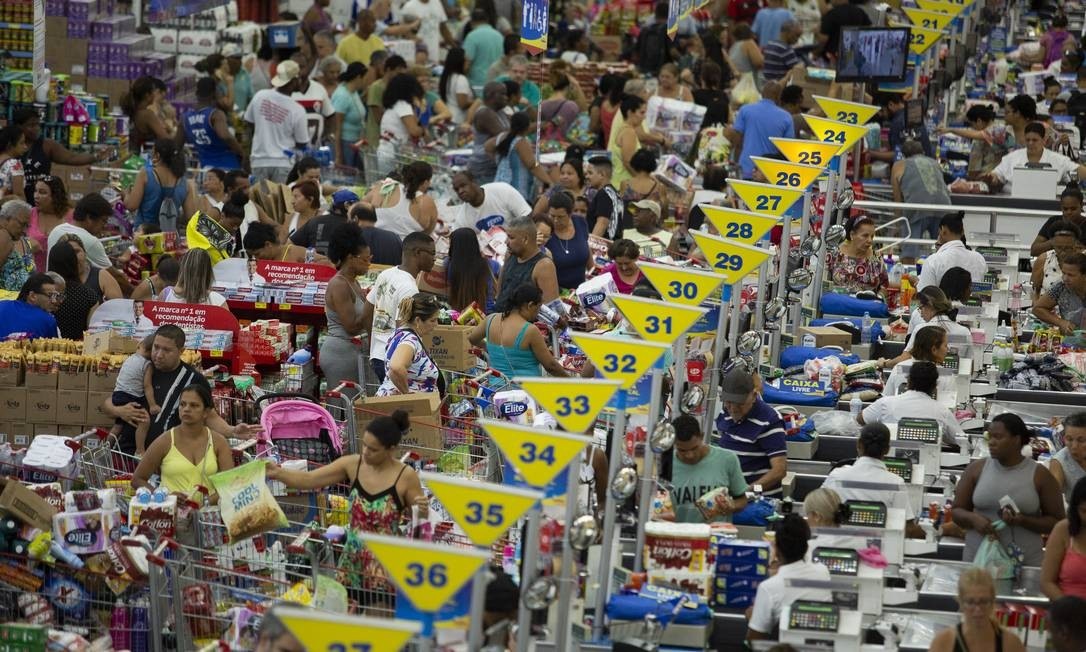RIO DE JANEIRO, BRAZIL – Afraid of shortages due to the novel coronavirus, a combination of what occurred in other countries and disinformation in WhatsApp groups led Brazilians to rush to supermarkets as soon as the first social isolation measures were announced.
Consumption exploded. From January to June this year, real sales in the supermarket sector in the state of São Paulo grew 7.4 percent compared to the same period in 2019.
But as these numbers cool down and return to normal due to the reopening of non-essential markets, the São Paulo Supermarket Association, APAS, suffers from a flurry of municipal decrees in São Paulo’s interior areas that restrict the operation of these establishments.

With the spread of the virus in several interior cities, many city halls have ordered the suspension of supermarket activities on Saturdays and Sundays. In search of defending what it understands to be the law of the sector, APAS decided to contest this closing in Court.
The conflict has already affected at least 25 cities. And the most indigestible case, the judicial dispute between the association and the city of São José do Rio Preto, has ended up in the hands of the Federal Supreme Court Chief Justice Dias Toffoli.
The spread of infection in the interior of São Paulo prompted Governor João Doria to order several cities to revert to the red phase, where only essential trade can continue to serve the population – in this case, drugstores, gas stations, and supermarkets.
Faced with the health debacle that plagues Brazilians, some cities decided to restrict the schedule and working days for supermarkets in the state’s inland. The measures, considered radical by some, were justified by the high occupancy rate of public beds in these regions. APAS did not accept this justification and went to Court.
The imbroglio involving the city of São José do Rio Preto is drawing the most attention. In the lower court, the city lost the dispute with the association in the district, but appealed and drove the case to the STF, where Chief Justice Dias Toffoli rendered a decision favorable to the decree issued by Mayor Edinho Araújo.
“The dramatic situation encountered by the municipal authority that issued the measure has been duly evidenced here, fully justifying the restrictions imposed on the operation of certain sectors of local trade, at the risk of seeing its public healthcare system collapse,” said Toffoli.
Last Wednesday, July 29th, the mayor of São José do Rio Preto issued a new decree, ordering the closure of supermarkets on weekends until August 10th. APAS is expected to launch a new legal battle against city hall. Among the 25 cities that ordered the suspension of the sector’s activities on weekends, three have been represented by APAS in Court: Bragança Paulista, Limeira, and São José do Rio Preto.
In towns such as Araras, Santa Fé do Sul, Salto de Pirapora, Tanabi, and Votorantim, the association that represents the sector has emerged victorious. “The sector is known as essential because it sells basic items for the population, which cannot be suppressed from the supply of food and hygiene products,” says Ronaldo dos Santos, APAS’ president. “It’s the right of a supermarket to open and the right of the population not to have this supply interrupted.”
Outside the judicial sphere, São Paulo entrepreneurs expect a slim growth of 0.5 percent for Father’s Day, to be celebrated on Sunday, August 9th. For Ronaldo dos Santos, after the significant increase in sales, the sector should experience a slight retraction and end the year with a real growth between three and four percent compared to the previous year. “The risk we observe is related to the increase in the level of unemployment in the country. Without income, people will buy less and less.”
“That’s why our growth in the second half of the year should be minimal,” he says. From January to June, the group of products suffering the highest price increase in the state of São Paulo was fresh food. The rise was 11.57 percent, driven by tubers (33.55 percent) and vegetables (25.57 percent).
On the other hand, beverages became cheaper (-0.17 percent), mainly alcoholic beverages, which recorded a retraction of 3.91 percent. According to the APAS, some of the items that increased the most since the start of the pandemic were rice, cooking oil, milk, and beans. With the recent rise in the dollar, Santos projects that the second half of the year could see a rise in the prices of items such as rice, corn, and milk.
But not everything is negative. Santos celebrates the progress of e-commerce for the period. With the pandemic, the share of e-commerce in the supermarket sector increased from two to four percent. Carrefour Brasil recently announced that it has achieved even greater numbers: it saw e-commerce sales reach eight percent of its revenue.
But Santos stresses that there are still obstacles. “Our sector hadn’t been permeated by e-commerce yet, because we have an obstacle that is perishable products. Fruit, vegetables, meat, and cold cuts are still products that people are used to choosing, literally, by hand. Shifting this sale to digital is not easy,” he explains.
Source: Veja

